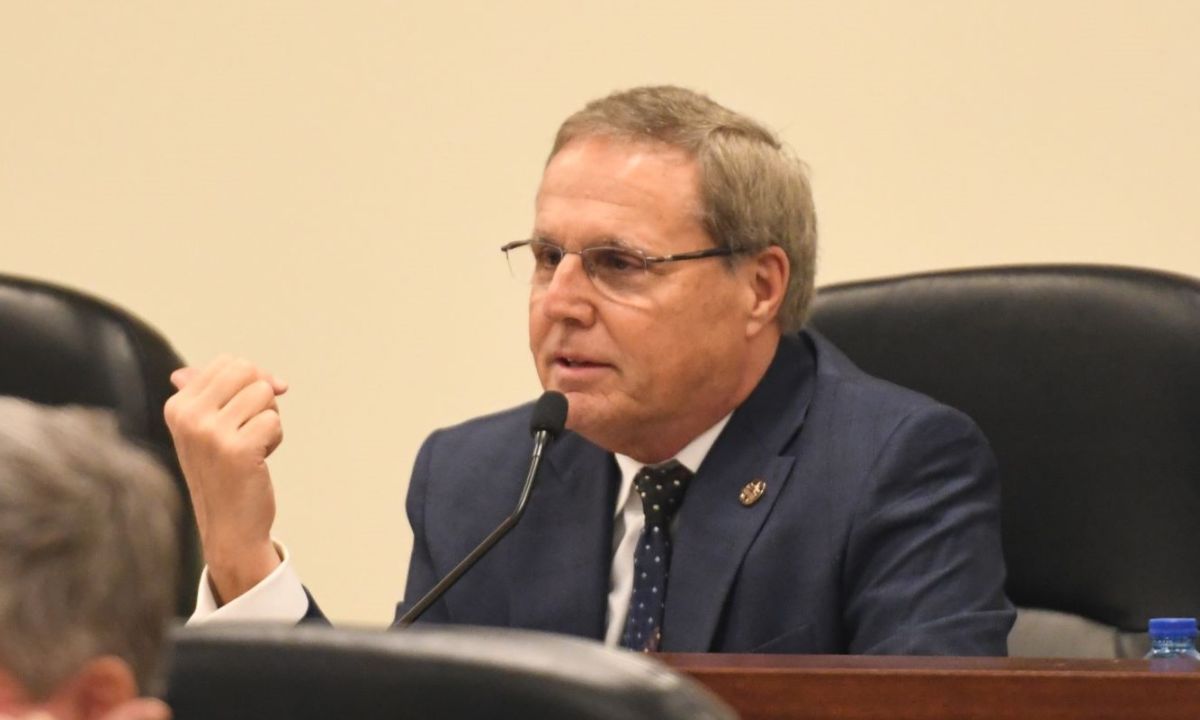Alabama House Passes School Voucher-Like Program
The measure would give households up to $7,000 to use for non-public education, including private schools and tutoring.

Get stories like this delivered straight to your inbox. Sign up for The 74 Newsletter
The Alabama House of Representatives Tuesday approved a a voucher-like program for schools after a debate lasting over four hours.
HB 129, sponsored by Rep. Danny Garrett, R-Trussville and known as the CHOOSE Act, passed the House on a 69-34 vote. Six Republicans joined Democrats in voting against the bill.
Supporters of the bill said it would give opportunities to students in struggling schools to find better education.
“The CHOOSE Act will provide an opportunity for students to learn and thrive in an environment that best meets their needs, which could be a public school,” said Garrett during the debate Tuesday.
Opposition to the bill came mostly from Democrats, who said that the bill would destroy public education in Alabama. Some likened the bill to a form of modern-day segregation.
Rep. Curtis Travis, D-Tuscaloosa, cited his experience during desegregation of schools in Hale County in the late 1960’s and early 1970’s, when private schools serving mostly white students were built in response to federal desegregation orders. He said he was worried that the Legislature would be using tax dollars “to create separation.”
“It’s not that history tends to repeat itself, but that people tend to repeat history,” Travis said.
The legislation would allow households with school-age children to claim up to $7,000 in tax credits to be spent on certain education-related expenses, including private school tuition, tutoring or education services for children with disabilities.
The Legislature must appropriate at least $100 million for the program each year. The first 500 spots are reserved for students with special needs, defined by individualized education plans (IEP) or 504 plans.
The program will initially be limited to families making less than 300% of the federal poverty line, or around $75,000 for a family of three, but it would give priority to households with lower incomes. The funds would eventually be made available to all households. The special needs-reserved spots are not limited to the income level.
While Democrats have always opposed voucher and voucher-like legislation, Republicans from rural areas have also tended to be wary of voucher bills out of fear it would divert resources from their local schools.
Reps. Alan Baker, R-Brewton; Tracy Estes, R-Winfield; Chris Sells, R-Greenville; Randall Shedd, R-Fairview; David Standridge, R-Hayden and Tim Wadsworth, R-Arley voted with Democrats against the bill.
House Education Policy Committee Chair Terri Collins, R-Decatur, who introduced the legislation on the House floor, said the bill had “a lot guardrails” that protect public schools, such as allowing parents to judge school performance by comparing students’ results with those of students around the nation.
“I like accountability. I see that in this bill,” Collins said.
Democrats remained skeptical. Rep. Sam Jones, D-Mobile, echoed Travis and said that the legislation could promote segregation.
“What we have here, as I said earlier, is a real experiment, and for the sake of the kids in this state, I hope it works,” Jones said.
Garrett rejected the argument that the legislation could promote segregation, at one point saying that “we need to move past that.”
Rep. Barbara Drummond, D-Mobile, said that “accountability and transparency is not equal in this bill.” Private and public schools are governed by different rules, Drummond said.
“The same rules ought to apply to both public and private school, so we’ll have apples and apples. Right now, this legislation doesn’t do that,” Drummond said, adding that they don’t know if teachers in the private schools will be certified.
Garrett also blocked attempts by more conservative lawmakers to expand the program.
Rep. Arnold Mooney, R-Indian Hills, said he was concerned the legislation does not give parents enough choice and offered an amendment that would have provided that education service providers do not have to be approved by the Alabama Department of Revenue. The amendment was tabled 85-11.
“Opening this up to all children would be an amazing thing for this state,” Mooney said, adding that the amendment would allow any child to “compete” for the educational savings account.
Rep. Ernie Yarbrough, R-Trinity, offered another amendment that would have allowed the funds to be used for “micro” or hybrid schools. That amendment was tabled 82-9.
“I think it’s really important that we stand for the heart of what this bill is trying to accomplish,” Yarbrough said.
Rep. Ben Harrison, R-Elkmont, offered an amendment that would have expanded the allowed use of the funds in the educational savings account. The amendment would have allowed the money to be used for vocational or GED training; purchasing computer hardware and school uniforms, and transportation. It was also tabled 82-7.
“No two students, no two children are alike. They have different needs and different aptitude,” Robinson said.
Amy Marlowe, executive director of the Alabama Education Association, said in a statement Tuesday that while the association has worked with “others in a good faith way to fashion a bill that does not hurt Alabama schools,” a majority of Alabamians across the political spectrum oppose “unlimited funding being diverted from the Education Trust Fund for this program.”
“We want to continue to work to find common ground on this proposal as the bill moves to the Senate, but a cap must be included in the bill to protect the future of our local schools, or it should not pass,” she said in the statement.
The bill moves to the Senate.
Alabama Reflector is part of States Newsroom, a nonprofit news network supported by grants and a coalition of donors as a 501c(3) public charity. Alabama Reflector maintains editorial independence. Contact Editor Brian Lyman for questions: [email protected]. Follow Alabama Reflector on Facebook and Twitter.
Get stories like these delivered straight to your inbox. Sign up for The 74 Newsletter

;)